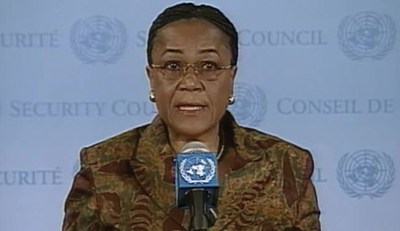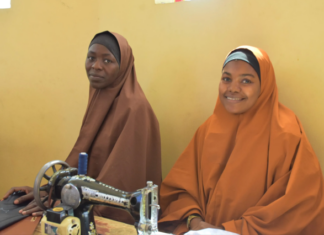Last month, Nigeria’s Permanent Representative at the United Nations (UN), Professor Joy Ogwu, headed the UN Security Council deliberations for the month of August. The UN Secretary-General, Ban Ki-moon, who was in Nigeria between August 24 and 25, did announce with a sense of gratitude that Nigeria would chair the foremost body’s rotational annual deliberations for the month of August 2015.
Professor Ogwu presided over the session during which global security – a pressing issue – was discussed.
It was the first time Nigeria would be presiding over the affairs of the topmost organ of the UN since the coming to power of the Muhammadu Buhari presidency.
Nigeria, like most African countries, has always campaigned for proper recognition in the politics and functions of the UN, especially at its topmost organs such as the Security Council. After many years of isolation, Nigeria has pushed its presence to many supranational platforms since the return to democracy in 1999. The most populous black nation would not like to miss the diplomatic recognition that comes with such global presence, which could be why President Buhari quickly rescinded his earlier recall of the former Director-General of Nigerian Institute of International Affairs (NIIA) in July.
Agenda
According to Head of Media at the UN, Dr. Tope Elias Fatile, ‘Peace and Security in Africa’, with a focus on the Ebola Virus Disease (EVD) and the role of regional and sub-regional groupings formed a major part of the deliberation of the UNSC presided over by Ogwu. In fact, one of the meetings held on August 18 focused on Regional Organisations and Contemporary Challenges of Global Security.
Speaking on the essence of regional and sub-regional groupings as efficient tools for achieving global security, the UNSC president spoke about their role as international organisation: “They should be the first responders to the challenge of international peace and security because they understand the dynamics of their environment better and they understand the dynamics involved in their region. It is therefore necessary to encourage member states to deal with the situation in their regions as it concerns them.”
All regional organisations around the world attended the event.
A security sector reform summit held on August 20 as part of the agenda presided over by Ogwu reflected on why security challenges persisted in many countries of the world.
Regional organs and challenges
The role regional organisations are supposed to play in accelerating world peace was extensively discussed at the August 18 to 20 UNSC meeting. The issue of how effective regional organisations have been restoring peace in the world has been effectively demonstrated in the many conflicts that have taken place in Africa in this century. In the past 15 years, according to observers of global politics, the Organisation of African Unity (OAU), now African union (AU), found it expedient to look inward in search of solutions to most of the political crises in the continent.
Within the century, the AU set up a standby military unit of its own, and individual member states stopped the habit of relying on their proxy masters in the West and East. That used to be the behaviour of African governments in the 1970s, 80s and 90s during which the big ideological powers – North America and Western Europe versus USSR, China, North Korea etc (the old capitalist states versus communist states) – dominated global politics. AU’s about 52 members are sharply divided along these ideological alliances, being satellite outposts. That, in part, prolonged the cold war and brewed series of political turmoil and coups in many states of Africa. This also retarded development and resulted in poverty in many parts of Africa.
Thus when the Cold War ended towards the end of the 90s into the new millennium, and with sundry arms reduction, treaties signed between East and West, buoyed by the former communist bloc, embrace of economic liberation at the turn of the century, African states became a bit less attractive as economic power centres, having become more of hotbed of political and social crises, hunger, refugees and incessant military intervention.
When at the beginning of the century the UN General Assembly adopted a resolution mandating states not to enter into any economic or political bilateral treaty or co-operation with any military junta, some dose of democracy entered Africa, and AU found the need to form a standing army with which it has intervened in many war-torn places in Africa: Liberia, Sierra Leone, Senegal, Rwanda etc, complemented by UN contributions.
As noted by Professor Ogwu: “Regional organisations are the first responders to crisis in member states because they understand the immediate causes or the root of the crisis.”
It is the opinion of scholars of international diplomacy that the UN has succeeded a lot in containing many crises in the world due to the increasing use of regional and sub-regional groupings. In its new theme of deepening the security of nations under the UNSC peace and security reform, the body received several progress reports on peace efforts from different parts of the world and made fresh resolutions.
UNSC 2015 discussions and resolutions
The UNSC under Ogwu sat throughout the month of August. It was Nigeria’s turn, and no doubt issues that concerned Africa were discussed.
On Iran/Syria crisis, the UNSC adopted ‘Resolution 2170’ made in 2014 condemning gross, widespread abuse of human rights by extremist groups in Iraq and Syria since their crises started. It read in part: “Calling on all UN member states to act to suppress the flow of foreign fighters, financing and other supports to Islamist extremists groups in Iraq and Syria, the Security Council this afternoon put six persons affiliated to these groups on its terrorists sanction lists.
“Through unanimous adoption of ‘Resolution 2170 (2014) under the binding Chapter VII of the United Nations Charter, the Council condemns in the strongest terms what it called gross, systematic and widespread abuse of human rights by the Islamic State In Iraq and the Levant (ISIL), also known as (ISIS) and Al-Nusra Front.”
An annex to the text named the individuals subject to travel restrictions, assets freeze, and other measures targeted at Al-Qaeda affiliates (Abubr-kar Al-Bahgdadi). Leader of ISIS was not among because he has been listed since 2011.
The resolution went further to state: “It (UN) calls on member states to take national measures to prevent fighters from travelling from their soil to join the groups, reiterating obligations under counter-terrorism resolutions to prevent the movement of terrorists as well as their supply with arms or financial supports. It expressed its readiness to consider putting on the sanctions list those who facilitated the recruitment and travel of foreign fighters.”
Through the resolution, the Council demanded that ISIL-Al-Nusra Front and all other entities associated with Al-Qaeda cease all violence and terrorist acts, and immediately disarm and disband.
Recalling that their attacks on civilians on the basis of ethnic or religious identity might constitute crime against humanity, the UNSC stressed the need to bring those perpetrators, including foreign partners, to justice. The Council also directed the sanctions monitoring team to report on the continuing threat posed by ISIS, and the form and sources of their arms, funding, recruitment and demographics, and to present recommendations within 90 days to further address the threat.
Following action on the text, its adoption was welcomed by representatives of UNSC members: United Kingdom, Russia, United States, Australia, Jordan, China, France, Chad and Chile along with the representatives of Iraq and Syria.
Chemical weapons
Another matter under its search for peace in the world is that of use of chemical weapons. Here, the Ogwu-chaired session unanimously adopted ‘Resolution 2235 (2015)’ establishing mechanisms to identify perpetrators using chemical weapons in Syria.
The UNSC resolved: “The Security Council recalling the protocol for the prohibition of the use in war of asphyxiating, poisonous or other gases and of bacteriological methods of warfare and the convention on the prohibition of the development, production, stockpiling and use of chemical weapons and on their destruction (CWC) and the Council’s resolutions 1540 (2004), 2118 (2013) and 2209 (2015).”
The UNSC also took fresh positions over Israeli-Lebanon stand-off. It resolved: “The situation under the area of operation of the United Nations Interim Force in Lebanon (UNIFIL) and along the Blue-Line remained generally calm, despite the terse regional context and following the serious breach of the cessation of hostilities between Lebanon and Israel.”
Other resolutions
The UNSC Committee established, pursuant to Resolution 2140, debriefing by Amer Doudi, Regional Humanitarian Coordinator for the Yemen Crisis, on his ongoing efforts to implement UN verification and inspection mechanism for Yemen embroiled in political crisis since 2009.
On August 21, UNSC also in pursuant of Resolution 2206 of 2015 concerning the crisis in South Sudan were briefed by the Coordinator of the Panel of Experts on South Sudan and deliberated on an interim report it submitted.
On Central African Republic (CAR), UNSC held meeting with the representatives of CAR, its neighbouring states and the coordinator of the panel of experts discussing arms embargo against Sudan and its leader, Omar Al Bashir, who had failed to submit to International Criminal Court (ICC) on war crimes.
In all, it was a busy month and a moment of global impact by Nigeria in the diplomatic arena. Many issues affecting the peace, health and development of Africa were effectively moderated by Professor Ogwu as President of UNSC August 2015 meeting. If for nothing else, her brilliant performance as endorsed by Ki-moon here in Nigeria late last month has ensured her retention as Nigeria’s permanent UN representative by the Buhari administration.














